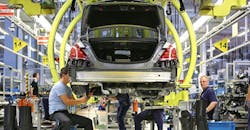Export Woes Turn German Industrial Titans to Millstones
Germany's industrial firms flourished in a world that couldn't get enough of their cars and machine tools, but a global trade slowdown combined with sluggish product upgrades and delays in modernizing Europe's top economy is now taking their toll.
On April 4 saw federal statistics authority Destatis report a 4.2% month-on-month reduction in industrial orders for February.
"Today's new orders were simply awful," ING economist Carsten Brzeski commented, noting that the reading -- a closely-watched indicator of future performance -- was all the more "painful" as it disappointed widespread hopes of a rebound.
"When compared to their peak at the end of 2017, orders are down close to 10%," pointed out analyst Dirk Schumacher of Natixis bank.
Last year already brought a slowdown for Europe's largest economy, bringing it to the brink of a "technical recession" -- defined by two quarters of contraction in a row.
In the event, output shrank 0.2% between July and September before flatlining in the following three months.
At the time, most blamed one-off factors, including low water levels in the vital Rhine inland waterway after a hot, dry summer and new emissions tests that proved a bottleneck for car manufacturers.
China and Brexit
"Germany, we need to talk," Pictet Wealth Management economist Frederik Ducrozet joked on Twitter on April 4..
The "series of shocks" that hit in 2018 was not enough to explain industrial weakness, he judged, arguing that the economy "remains over-exposed to global trade" -- turning the bonanza of massive export surpluses seen in recent years into a menace.
February's industrial orders figures show clearly that demand fell most sharply from countries outside Germany's immediate neighborhood in the 19-nation eurozone, shedding 7.9%.
Eurozone orders fell less steeply, at 2.9%, while domestic demand was most resilient, losing just 1.6 %.
Casting around for an explanation, Commerzbank economists judged that "the trigger for the current weakness probably lies in China," while their counterparts at LBBW suggested the drop "can likely be traced back to elevated uncertainty related to Brexit".
Either way, flagging industrial orders and production "increased the risk of a decline in real GDP" in the first three months, Commerzbank said.
Also on April 4, Germany's most respected economic think-tanks published a joint forecast predicting just 0.8% growth in 2019, a massive tumble from their 1.9% estimate last autumn.
Foundations to Lay
Signs from abroad offer hope to some observers, as activity indicators in the Chinese and American economies appear to be rebounding off their lows -- something that should "be eventually also reflected in the German manufacturing data," Natixis' Schumacher said.
To tide it over, the German economy has solid domestic demand to rely on, with unemployment at just 4.9% -- a historic low since reunification in 1990 -- making the internal market one of its key drivers.
But month-to-month and quarter-to-quarter volatility in economic data may be the least of the worries for Europe's beating industrial heart.
Rather, bosses and politicians worry about how Germany can keep up with megatrends bringing massive changes to production, consumption and regulation.
"We have to equip the German and European economy for the future," economy minister Peter Altmaier urged on April 4..
The close confidant of conservative Chancellor Angela Merkel has been drumming up support for an "industrial strategy" he says would support the growth of "champion" businesses on the scale required to take on U.S. and Chinese competition.
For now, social democratic finance minister Olaf Scholz is sticking to Germany's long-standing target of a balanced budget -- seen as vital in a country with an aging population.
But calls are growing for Berlin to reexamine a "debt brake" constitutional amendment adopted in the heat of the financial crisis, which limits public borrowing even for vitally-needed investments.
In the private sector, carmakers are making a transition to battery electric and hybrid vehicles set to prove costly in both investments and jobs, while the country also lags on digital infrastructure and artificial intelligence.
As if that weren't enough, Germany also has to prepare for exiting coal power by 2038, a major challenge for an electricity-hungry economy already well on the way to abandoning nuclear energy.
By Coralie Febvre
Copyright Agence France-Presse, 2019
About the Author
Agence France-Presse
Copyright Agence France-Presse, 2002-2025. AFP text, photos, graphics and logos shall not be reproduced, published, broadcast, rewritten for broadcast or publication or redistributed directly or indirectly in any medium. AFP shall not be held liable for any delays, inaccuracies, errors or omissions in any AFP content, or for any actions taken in consequence.
